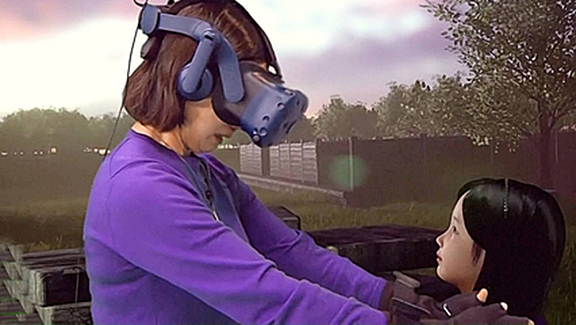Four Stranger Things
Like many of you, I’ve loved all things tech and computer – especially Internet – for most of my life. But I was always equally aware of the idea that when you give the gift of fire, it can both warm and destroy.
Computers have simplified our lives in many ways: speeding up communications; keeping watch over our schedules; automating chores and providing entertainment. But they have also, particularly with the advent of the Internet, challenged us with more opportunities to go astray.
Here are but four of those opportunities that recently came to our attention. What’s possibly most amazing is that 3 of the 4 were news – to me. 
1. Look Better on Zoom with a Face-Tracking App!
The idea of “touching up” one’s appearance on a web call isn’t new. Zoom lets you “enhance” your appearance by essentially softening the focus of your camera to lessen “the appearance of fine lines and wrinkles!” And for those a little more sophisticated and who are regular users, a ring light and setting the computer camera to eye level can assure that you look as good as possible. Adjusting your background can also take the effort out of getting the house ready.
But now we up the stakes by adding face-tracking software that can not only adjust imperfections, but eliminate a scar or pimple, even apply a coat of makeup!
First, for anywhere from about $10 on up, you can add a face-tracking camera to your gear – which might be especially handy if you do a lot of meeting via online video calls. Evaluated as of this calendar year, one such camera (OSBOT), selling for $90 for the 1080p and $150 for a 4k, will not only track your face, keeping it in perfect focus even if you’re an animated speaker, but will track it using AI, allowing the camera to enhance the lighting so that you look your best. Using its simple, plug and play features, you can adjust the background, autoframe, and use noise-cancellation to make your audio sound-stage quality.
Now add webcam software, and you never have to have a bad day. Mirror the camera image, enhance the audio, and using facial tracking, you can call up the face beautification feature of software like YouCam9, and filter for fun (turn yourself into just blue pixels, for example) or face enhancement – add some dramatic eyebrows, puff up your lips or smooth your tired eyes. It’s only money!
2. That OnlyFans Girl is Really Digital!
OnlyFans is simply one of a range of websites designed to pick the pockets of (mainly) men who find it easier to “date” a girl online than bother to go out and find a real girlfriend. Yes, the young ladies in question will do as requested (for a fee), but this is somehow not “real” given that he’s here and she could be anywhere (or vice versa). However, what was a fairly easy way for a willing and reasonably attractive girl to make money is a perfect setup for a digital “girl.”
If you follow gaming, or are a fan of movies, you’ll already know that digital effects have gone from “ok” to “amazing” in no time at all. Just think of Gollum in the Lord of the Rings – not a new series of films by any means – and you’ll know that if 20 years ago using a green suit and green screen, plus targeted points on the actor’s body, software could generation a realistic looking creature like that, what have the intervening years made possible? Anyone can now render a realistic looking person that will replace you in much the same way, allowing you to interact but the viewer to “see” the Gollum-like, or dolly-like, creature you have created (including a voice of your choosing). One coder’s YouTube Channel tells us, “AI influencers are getting filthy rich… let’s build one!”
3. Meeting Someone Who Has Died Using Virtual Reality.
This isn’t just a “could be,” this is actually possible. Trendingly, a website that features funny, feel-good, and otherwise amusing videos and memes, recently offered a video of a Korean mom who had lost her young daughter, and opted for a virtual reality reunion. The video of the event shows the mother and child as if in a film, together. We don’t see exactly what the mother sees, but the effect is quite clear, as the mom weeps, reaches out to her virtual child, and they share a birthday lunch. This is all juxtaposed with the mother sitting in a green room wearing goggles and mitts to enable her experience of once more getting a chance to interact with her daughter.
The mixed reaction was clear in the comments, with some people finding it a sweet and touching moment, and others finding it disturbing and distressing. But the “reality” of such an experience is quite clearly on the table – and it forces us to wonder if we’d go that route, or be satisfied with our memories.
Another possibility using this tech would be to “meet” a famous person of history: this is your chance to chat with The Bard, spend an afternoon with George Washington, or perhaps even have dinner with (movie star of choice). With enough general information available, and some imagery – that speculative notion of meeting a famous person might now be (virtually) possible!
4. Omegle – The Pen Pal of the 2000s?
In 2009, a clever 18-year-old programmer, Leif K-Brooks, launched a new app from his parents’ home: Omegle. The app aimed to connect strangers for the experience of communicating with a random person on a topic of mutual interest. Where it went from the “introduction” was up to the individuals.
Needless to say, it went just where you might have expected, given a moment to consider the possibilities.
When he took down the website in November of this 2023, K-Brooks defended the app with an appeal written to explain why it was disappearing. He suggested that Omegle had served the greater good because it interacted with authorities to fight crime and misuse – to trap predators, using state of the art AI operating with “a wonderful team of human moderators.”
Wikipedia noted, however, that “Omegle was subject to a variety of controversies, generally surrounding illegal content, discrimination, pornography, and use of the site by minors. Prior to early 2013, the site did not censor contributions through a profanity filter, and users often encountered nudity and sexual content.”
While unlikely, the founder and others wondered whether, absent the rapid increase in users during the Covid lockdown, the site would have become so mired in misuse.
It wasn’t long, almost needless to say, after the closing down of Omegle, that new sites/apps came along to take its place. One of them, “monkey.app/omegle” is quite clear that it outdoes Omegle with its younger crowd and TikTok vibes.” And it quite clearly offers you its service: “Talk to strangers!”
Stranger things, indeed.










